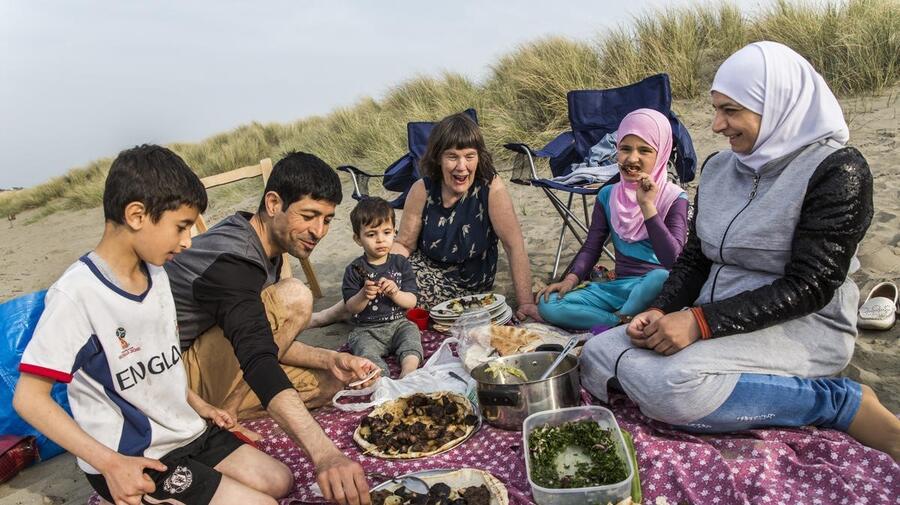الكفالة المجتمعية
الكفالة المجتمعية

تماشياً مع نهج أصحاب المصلحة المتعددين ونهج المجتمع بأكمله المطلوب لتحقيق أهداف الميثاق العالمي بشأن اللاجئين، تعد الكفالة المجتمعية وسيلة ملموسة ومجزية للأشخاص والمنظمات والمجتمعات المحلية لدعم استقبال اللاجئين واندماجهم.
من خلال توفير الدعم العملي للاجئين الوافدين حديثاً، يمكن للمواطنين والمجتمعات أن يحدثوا أثراً فعلياً وأن يساعدوهم على إعادة بناء حياتهم في وطن جديد.
ما هي الكفالة المجتمعية؟
يشير مصطلح الكفالة المجتمعية إلى برامج يتعاون فيها الأفراد أو المجموعات معاً لتقديم الدعم المالي والمعنوي والعملي لاستقبال وإدماج اللاجئين الذين تم قبولهم في بلادهم من خلال إعادة التوطين، في أعقاب إحالة من المفوضية، أو عن طريق إحدى المسارات التكميلية مثل التعليم أو فرص تنقل اليد العاملة.
في حين حققت برامج الكفالة نجاحاً كبيراً في كندا لعقود من الزمن، حيث تم بفضلها استقبال أكثر من 300 ألف لاجئ في البلاد، فقد جرى وضع معظم البرامج الأخرى في الآونة الأخيرة نسبياً استجابة للأزمة السورية، وكذلك باعتبارها تعهدات تم الإعلان عنها في أعقاب الميثاق العالمي بشأن اللاجئين. في المنتدى العالمي الأول للاجئين الذي عقد في ديسمبر 2019، تعهدت البرازيل وبلجيكا ومالطا والبرتغال بدراسة نماذج تجريبية للكفالة المجتمعية. وكجزء من ميثاق الاتحاد الأوروبي بشأن الهجرة واللجوء لعام 2020، التزمت المفوضية الأوروبية بدعم خطط الكفالة المجتمعية الوطنية من خلال التمويل وبناء القدرات وتبادل المعرفة - بالتعاون مع المجتمع المدني – وذلك لإعداد نموذج أوروبي للكفالة المجتمعية.
في الوقت الحالي، أجرت العديد من البلدان على مستوى العالم تجارب حول برامج الكفالة المجتمعية أو أنشأتها، بما في ذلك أستراليا ونيوزيلندا والمملكة المتحدة وإسبانيا وألمانيا.
ما هو دور الجهات الكفيلة؟
في الكفالة المجتمعية، يمكن للأفراد أو المجتمع تشكيل مجموعة من "الجهات الكفيلة" والالتزام بدعم اللاجئين بشكل مشترك لبناء حياتهم في بلدهم من خلال مساعدتهم على التكيف مع الثقافة والتقاليد المحلية، وتقديم المساعدة اللغوية والدعم اللوجستي، والمشورة بشأن القضايا العملية، وتوفير فرص بناء العلاقات والتعارف.
لا يشارك الكفلاء في اختيار المستفيدين ودخولهم للبلاد، ويبدأ دورهم بمجرد وصول الشخص المكفول إلى بلدهم. يتحملون كمجموعة مسؤولية محكومة بفترة محددة زمنياً ويلتزمون بتقديم خبراتهم الشخصية ومواردهم وجهات اتصالهم لدعم اللاجئين الوافدين حديثاً.
لمَ الكفالة المجتمعية؟
يمكن للكفالة المجتمعية أن تجلب معها قيمة مضافة كبيرة وأن تعود بالفائدة على كل من اللاجئين والمجتمعات المحلية. وعلى وجه الخصوص، فإنه يمكنها:
المساعدة في بناء قدرات بلدان إعادة التوطين والسماح للمزيد من اللاجئين بالحصول على الحماية والحلول الدائمة: يمكن لبرامج الكفالة المجتمعية أن تساعد في إنشاء أو توسيع برامج إعادة التوطين في بلدان جديدة والتي لم تكن ممكنة لولا ذلك بسبب نقص البنية التحتية وخدمات الاندماج.
تحسين آفاق الاندماج: تشير الدلائل إلى أنه من المرجح أن تعزز الكفالة المجتمعية فرص الاندماج للاجئين. توفر المجتمعات المحلية نصائح حول الاندماج، وتقدم توجيهاً ثقافياً غير رسمي، وتساعد في مجال اللغة للاجئين الوافدين حديثاً.
بناء مجتمعات مرحبة وشاملة: يمكن لبرامج الكفالة المجتمعية أن تعزز التفاهم المتبادل والاحترام والتسامح وأن تساعد في بناء مجتمعات مرحبة وفقاً للهدف 3 من استراتيجية الثلاث سنوات حول إعادة التوطين والمسارات التكميلية. وعلى المدى الطويل، يمكن لمثل هذه البرامج أن تزيد الدعم المقدم للاجئين وأن تساهم في تغيير الخطابات المناهضة للاجئين التي تصورهم كعبء أو تهديد. كما أنها تتيح للاجئين فرصة إظهار مهاراتهم وقدراتهم ورد الجميل لمجتمعاتهم.
توفير تجربة مجزية للأفراد والمجتمعات: برامج الكفالة المجتمعية هي وضع يعود بالنفع على الجانبين. بالنسبة للكفلاء، يمكن أن تكون هذه البرامج تجربة مجزية حقاً حيث توفر لهم فرصة فريدة لتغيير حياة أشخاص أجبروا على الفرار والمساهمة بنشاط في تلبية الاحتياجات الإنسانية المتزايدة. كل ذلك يأتي مع دعم رفاه مجتمعهم وتكوين روابط قوية مع اللاجئين.
الكفالة المجتمعية والكفالة الخاصة
على الرغم من أن الكفالة المجتمعية والكفالة الخاصة تنطويان على مشاركة المجتمعات المحلية في استقبال اللاجئين وإدماجهم، إلا أنهما مختلفتان بطبيعتهما ويجب التمييز بينهما بوضوح.
مسارات الكفالة الخاصة هي مسارات تكميلية تسهل قبول اللاجئين في بلد جديد. بالنسبة للكفالة الخاصة، فإن الجهة الكفيلة تلعب دوراً رئيسياً طوال العملية؛ فهم الذين يحددون ويختارون المستفيدين ويشاركون بشكل مباشر في دخولهم إلى البلاد واستقبالهم واندماجهم. أيضاً، وعلى عكس عملية إعادة التوطين، والتي تعتمد فقط على المخاطر التي يتعرض لها اللاجئون وعلى احتياجاتهم، والتي تتولى أمورهم المفوضية، تتيح مسارات الكفالة الخاصة للجهات الكفيلة فرصة ترشيح الأفراد بناءً على اعتبارات أخرى مثل الروابط العائلية، أو المهارات، أو الكفاءات المهنية، أو التعليمية.
وعلى العكس من ذلك، بالنسبة للكفالة المجتمعية، فإن الأفراد والمنظمات و/أو المجتمعات الكفيلة توفر الدعم لاستقبال وإدماج الأشخاص الذين تم قبولهم بالفعل في بلد ما من خلال إحالة من المفوضية أو من خلال مسار مختلف، مثل التعليم أو فرص العمل. في الكفالة المجتمعية، يتم اختيار الشخص المكفول وقبوله بشكل مستقل عن الكفيل، ولا يبدأ دور الكفيل إلا بعد وصول المستفيد من الكفالة إلى البلد المضيف.
المبادرة العالمية لكفالة اللاجئين
المبادرة العالمية لكفالة اللاجئين هي نموذج شراكة متعدد الأطراف والقطاعات، وقد نجحت في بناء القدرات وتعزيز الكفالة المجتمعية للاجئين.
تقود هذه المبادرة المشتركة حكومة كندا، ومفوضية اللاجئين، ومؤسسات المجتمع المفتوح، ومؤسسة جيوسترا، ومؤسسة شابيرو، وجامعة أوتاوا، وتهدف إلى زيادة وتحسين إعادة توطين اللاجئين عالمياً من خلال إشراك المواطنين والمجتمعات المحلية والشركات في جهود إعادة التوطين، وتعزيز المجتمعات المحلية المضيفة التي تتكاتف للترحيب بالوافدين الجدد، وتحسين السردية حول اللاجئين.
تعرّف على المزيد حول برامج الكفالة المجتمعية من شريك المفوضية: المبادرة العالمية لكفالة اللاجئين.

